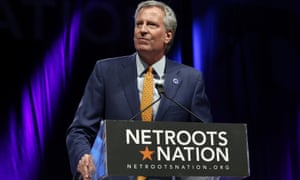
To New York mayor Bill de Blasio, Rupert Murdoch is directly responsible for Donald Trump.
In fact, De Blasio argues, “if you could remove News Corp from the last 25 years of American history, we would be in an entirely different place”.
In his view, without the malign influence of Murdoch’s media empire and its conservative Trump-supporting Fox News “we would be a more unified country. We would not be suffering a lot of the negativity and divisiveness we’re going through right now. I can’t ignore that.”
De Blasio spoke to the Guardian in New Orleans, hours before he took the stage at the annual Netroots Nation conference of progressive activists.
The New York mayor, who has never been on the best of terms with the famously aggressive press in his hometown, has his own criticisms of America’s media but has not restrained his attacks on Trump for branding reporters “the enemy of the people”.
“There is no comparison between a progressive critique of the media – and overwhelmingly corporate media, by the way – and a president who does not believe in free speech and is trying to undermine the norms of democracy,” he said.
He did make clear that “if you see a steady decline in democracy, we’re going to have to vividly defend a lot of media we don’t agree with. But I don’t want to give them a free pass on what they have done to all of us.”
The venue presented an opportunity for De Blasio, who describes himself ideologically as “one part social democracy, one part New Deal, one part liberation theology”, to lay out his vision for progressive politics.
It also provided a national platform for someone who has paid several visits to Iowa and mentions the early presidential primary states of Nevada and New Hampshire without prompting. De Blasio acknowledged he was “interested in continuing in public service” after the term-limited mayor finishes his stint in city hall.
De Blasio was once considered the new face of progressive politics in the United States after his victory in the Democratic primary for mayor of New York in 2013. However, he has since receded in the national spotlight both as he has dealt with the everyday business of governing New York City and as other figures such as Vermont senator Bernie Sanders have come to the fore.
While De Blasio touted his record in New York, attention at Netroots was focused on a recent congressional primary in the Big Apple rather its governance. The shock victory of Alexandria Ocasio-Cortez over incumbent Joe Crowley in a low turnout congressional primary captured national – and international – attention in part because Ocasio-Cortez campaigned openly as a Democratic Socialist. But, to De Blasio, the debate over the term “socialist” was in some ways pedantic.
He described himself as a “social democrat” and said that “we should all be very comfortable saying that a social democratic vision that is active government addressing people’s needs is the direction our party has to go”.
De Blasio added the caveat that “I think a lot of this discussion in America really is essentially a social democratic vision that’s very synonymous with a progressive vision. I don’t see a lot of difference there.”
He insisted that there was “no contradiction” between identifying as a progressive or as a socialist. “Just like if you say I’m a Democrat, there’s more than one way to obviously be a Democrat – maybe too many ways to be a Democrat – I think it’s more than one way to be a socialist,” said De Blasio.
He also celebrated that the national conversation now allows people to identify as a social democrat or a Democratic Socialist or a socialist. “The fact that the word is now been liberated as part of the discussion is very, very healthy,” said the mayor.
De Blasio did not see any chance for a more moderate Democrat to succeed in 2020. When asked if a candidate from New York governor Andrew Cuomo’s moderate wing of the Democratic party could win the nomination in 2020, De Blasio said: “I don’t think so.” He made clear that he was “not talking about [Cuomo] personally”. Instead, the New York mayor said: “If you’re talking about what we might call ‘the historically moderate’ wing of the Democratic party, I think their time came and went.” De Blasio insisted “the next nominee will be a progressive, and I don’t have any doubt in my mind”.
But, before any dreams of 2020 happen, De Blasio still has to face crucial elections in 2018 to determine control of the New York state senate.
Although that body has nominally had a Democratic majority, it has been in Republican control, usually in coalition with a faction of breakaway Democrats called the Independent Democratic Conference (IDC). In cooperation with the IDC, Republicans in the state senate have often thwarted key De Blasio priorities.
De Blasio’s longtime political rival Cuomo brokered a deal for the IDC to reunite with rest of the Democratic party. It called for Democrats to back IDC members against primary challengers but a number of Democrats have since broken ranks.
When asked if he would follow suit, De Blasio played coy. “I’m about to start announcing some endorsements,” he said. “I won’t jump ahead because we’re almost there.”

